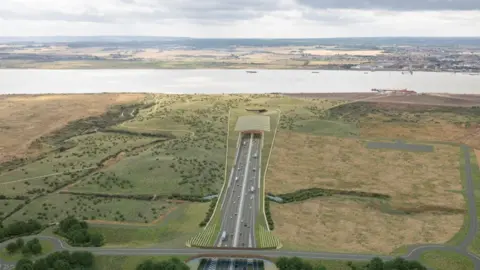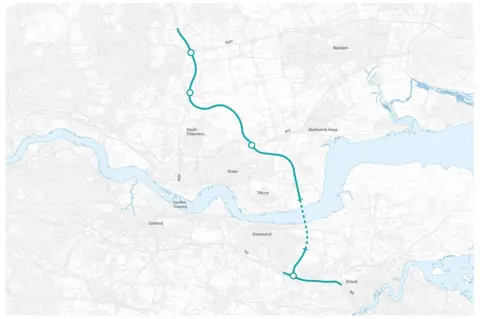Council letter to Treasury outlines Lower Thames Crossing concerns
 National Highways
National HighwaysA council has written to the Treasury expressing "significant concerns" about the viability of the proposed Lower Thames Crossing.
Thurrock Council's letter said the project no longer achieved its stated aims and needed to be re-examined.
The £8.2bn tunnel project will link Kent and Essex with a 14-mile (23km) stretch under the River Thames.
The route, which has been in discussion for more than 10 years, is estimated to open in 2029 or 2030.
In his letter to Simon Clarke, Chief Secretary to the Treasury, Rob Gledhill, Conservative leader of the council, said "significant and exceptional domestic and international challenges and events over the preceding three years" were behind the authority's call for reassessment.
"The council's concerns are exacerbated by poor engagement by National Highways, especially in relation to sharing key information about local impacts," Mr Gledhill said.
"The council contests that insufficient evidence has been presented to demonstrate that there are scheme benefits that outweigh these impacts".
Thurrock Council has prepared a 75-page response to go before councillors on 29 June before it is sent to National Highways, the Local Democracy Reporting Service said.
On Monday, Chris Stratford, who has been advising the council's Lower Thames Crossing Task Force, said the five-and-a-half-week public consultation had been launched too soon.
He said: "This consultation is premature when we have only just received the operation and construction traffic modelling. We haven't analysed it properly yet."
Mr Stratford said air quality, health impact and noise assessments were still outstanding.
But Mark Bottomley, development director for the Lower Thames Crossing said there was "an urgent need to address the challenges" faced by tens of thousands of people at the Dartford Crossing every day.
He said the crossing would almost double road capacity across the Thames east of London to ease congestion at Dartford.
"The Community Impacts Consultation held last year contained comprehensive information on air quality and health broken down area by area," he said.
Emissions figures, obtained through a Freedom of Information request, found the new route was estimated to create five million tonnes of carbon dioxide (CO2) over a 60-year period.
The project has proposed planting swathes of farmland to soak up the pollution.
Consultation on the plans ended on 20 June.
 National highways
National highways
Find BBC News: East of England on Facebook, Instagram and Twitter. If you have a story suggestion email [email protected]
